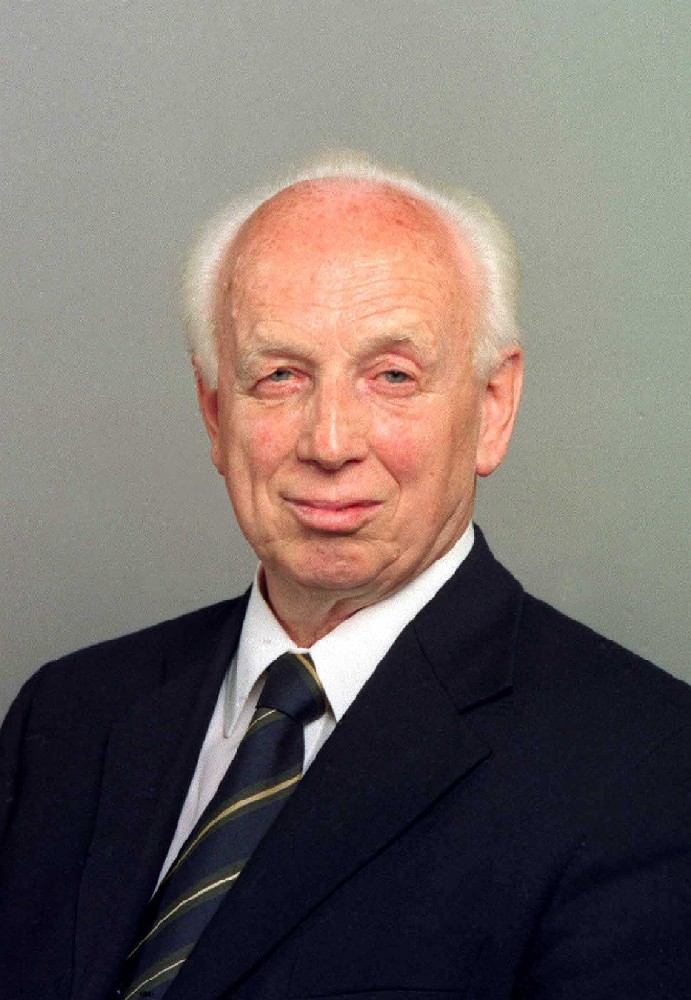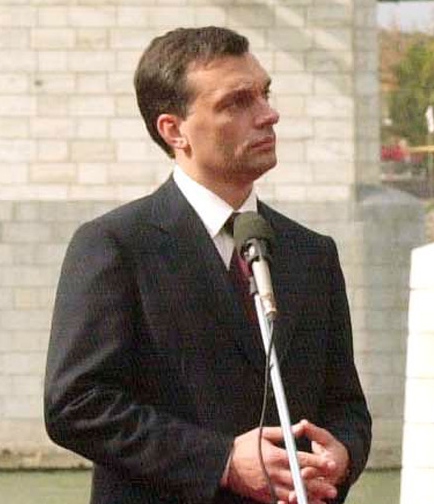|
2000 Hungarian Presidential Election
Background The term for the post of president in Hungary is 5 years. After the 2 consecutive terms of the previous office holder, Árpád Göncz, the succession was somewhat problematic. Though the coalition partner in the first cabinet of Viktor Orbán had its own candidate, party chairman József Torgyán, the leading party wanted another person. In the end Torgyán withdrew from the process. The voting process An indirect election was held on 5–6 June 2000. The only candidate was legal scholar Ferenc Mádl, who was nominated formally by FKGP but with the support of the leading party. The opposition parties did not nominate any candidates. After three rounds, Mádl was elected President of Hungary, taking the office on 4 August in that year. First and second rounds In the first two rounds, two-thirds majority requirement needed to elect the president, according to the Constitution. Results References 2000 Hungary Hungary ( hu, Magyarország ) ... [...More Info...] [...Related Items...] OR: [Wikipedia] [Google] [Baidu] |
Ferenc Mádl
Ferenc Mádl (; 29 January 1931 – 29 May 2011)Elhunyt Mádl Ferenc Index.hu was a Hungarian legal scholar, professor, and politician, who served as , between 4 August 2000 and 5 August 2005. Prior to that he had been minister without portfolio between 1990 and 1993 then Minister of Education between 1993 and 1994 in the conservative cabinets of and [...More Info...] [...Related Items...] OR: [Wikipedia] [Google] [Baidu] |
Árpád Göncz
Árpád Göncz (; 10 February 1922 – 6 October 2015) was a Hungarian writer, translator, agronomist, and liberal politician who served as President of Hungary from 2 May 1990 to 4 August 2000. Göncz played a role in the Hungarian Revolution of 1956, for which he was imprisoned for six years. After his release, he worked as a translator of English-language literary works. He was also a founding member of the Alliance of Free Democrats (SZDSZ) and Speaker of the National Assembly of Hungary (''de facto'' head of state) before becoming president. He was Hungary's first freely elected head of state, as well as the first in 42 years who was not a communist or a fellow traveller. He was a member of the international advisory council of the Victims of Communism Memorial Foundation. Biography Early life (1922–1945) Árpád Göncz was born on 10 February 1922 in Budapest into a petty bourgeois family of noble origin as the son of Lajos Göncz de Gönc (1887–1974), who worked ... [...More Info...] [...Related Items...] OR: [Wikipedia] [Google] [Baidu] |
Head Of State
A head of state (or chief of state) is the public persona who officially embodies a state Foakes, pp. 110–11 " he head of statebeing an embodiment of the State itself or representatitve of its international persona." in its unity and legitimacy. Depending on the country's form of government and separation of powers, the head of state may be a ceremonial figurehead or concurrently the head of government and more (such as the president of the United States, who is also commander-in-chief of the United States Armed Forces). In a parliamentary system, such as the United Kingdom or India, the head of state usually has mostly ceremonial powers, with a separate head of government. However, in some parliamentary systems, like South Africa, there is an executive president that is both head of state and head of government. Likewise, in some parliamentary systems the head of state is not the head of government, but still has significant powers, for example Morocco. In contrast, ... [...More Info...] [...Related Items...] OR: [Wikipedia] [Google] [Baidu] |
Hungary
Hungary ( hu, Magyarország ) is a landlocked country in Central Europe. Spanning of the Carpathian Basin, it is bordered by Slovakia to the north, Ukraine to the northeast, Romania to the east and southeast, Serbia to the south, Croatia and Slovenia to the southwest, and Austria to the west. Hungary has a population of nearly 9 million, mostly ethnic Hungarians and a significant Romani minority. Hungarian, the official language, is the world's most widely spoken Uralic language and among the few non-Indo-European languages widely spoken in Europe. Budapest is the country's capital and largest city; other major urban areas include Debrecen, Szeged, Miskolc, Pécs, and Győr. The territory of present-day Hungary has for centuries been a crossroads for various peoples, including Celts, Romans, Germanic tribes, Huns, West Slavs and the Avars. The foundation of the Hungarian state was established in the late 9th century AD with the conquest of the Carpathian Basin by Hungar ... [...More Info...] [...Related Items...] OR: [Wikipedia] [Google] [Baidu] |
First Orbán Government
The First Orbán Government was the fourth democraticly elected government in Hungary after the regime change. It existed between 1998 and 2002. Its creation was made possible by the FKgP: the party withdrew 82 candidates in the second round of the election, so FKgP voters voted for the local Fidesz candidate instead, thus reversing the election result. Due to the resignations in the Parliament afterwards, the votes of the way smaller but still large number of 48 smallholder representatives were essential for the formation of the government. The governmental relationship between the two parties was formed by the coalition agreement developed by the negotiating delegations, led by László Kövér and Béla Szabadi. The coalition government consisted of three parties: Fidesz, FKgP and MDF. The latter was introduced to the Parliament with the help of Fidesz. Prime Minister Viktor Orbán took his oath of office on July 6, 1998, and his ministers took office on July 8, two days lat ... [...More Info...] [...Related Items...] OR: [Wikipedia] [Google] [Baidu] |
József Torgyán
József Torgyán (16 November 1932 − 22 January 2017) was a Hungarian lawyer and politician, chairman of the Independent Smallholders' Party (1991−2002), Deputy Prime Minister and Minister of Agriculture and Rural Development (1998−2001) in the Government of Viktor Orbán. Biography Between 1951-1955 he studied at the Faculty of Law of the Eötvös Loránd University in Budapest (ELTE). He took part in the Hungarian Revolution of 1956. After graduation, he worked as a lawyer, since political activity was repressed. In 1988 he was among the founders of the Independent Smallholders Party. In 1990 he received the first seat in the National Assembly (re-elected in 1994 and 1998). After Fidesz had won the first round of the parliamentary elections in 1998, the Smallholders Party concluded an alliance with Fidesz, as a result of which center right parties obtained a majority in the National Assembly. The Smallholders Party, together with the Hungarian Democratic Forum (MDF) be ... [...More Info...] [...Related Items...] OR: [Wikipedia] [Google] [Baidu] |
Indirect Election
An indirect election or ''hierarchical voting'' is an election in which voters do not choose directly among candidates or parties for an office (direct voting system), but elect people who in turn choose candidates or parties. It is one of the oldest forms of elections and is used by many countries for heads of state (such as presidents), cabinets, heads of government (such as prime ministers), and/or upper houses. It is also used for some supranational legislatures. Positions that are indirectly elected may be chosen by a permanent body (such as a parliament) or by a special body convened solely for that purpose (such as an electoral college). In nearly all cases the body that controls the executive branch (such as a cabinet) is elected indirectly. This includes the cabinets of most parliamentary systems; members of the public elect the parliamentarians, who then elect the cabinet. Upper houses, especially in federal republics, are often indirectly elected, either by the ... [...More Info...] [...Related Items...] OR: [Wikipedia] [Google] [Baidu] |
Jurist
A jurist is a person with expert knowledge of law; someone who analyses and comments on law. This person is usually a specialist legal scholar, mostly (but not always) with a formal qualification in law and often a legal practitioner. In the United Kingdom the term "jurist" is mostly used for legal academics, while in the United States the term may also be applied to a judge. With reference to Roman law, a "jurist" (in English) is a jurisconsult (''iurisconsultus''). The English term ''jurist'' is to be distinguished from similar terms in other European languages, where it may be synonymous with legal professional, meaning anyone with a professional law degree that qualifies for admission to the legal profession, including such positions as judge or attorney. In Germany, Scandinavia and a number of other countries ''jurist'' denotes someone with a professional law degree, and it may be a protected title, for example in Norway. Thus the term can be applied to attorneys, judges an ... [...More Info...] [...Related Items...] OR: [Wikipedia] [Google] [Baidu] |
Independent Smallholders, Agrarian Workers And Civic Party
The Independent Smallholders, Agrarian Workers and Civic Party ( hu, Független Kisgazda-, Földmunkás- és Polgári Párt), known mostly by its acronym FKgP or its shortened form Independent Smallholders' Party ( hu, Független Kisgazdapárt), is a political party in Hungary. Since the 2002 parliamentary elections, the party has won no seats. History Founded on 12 October 1930, the party was one of the largest anti-fascist opposition parties in the 1930s and during World War II. Representing the interests of landed peasants along with some poor peasants and urban middle class, it advocated for land reform and democratization. Its members opposed Hungary's participation in World War II, giving anti-fascist speeches in Parliament and leading rallies as late as 1943. During the German occupation of Hungary, its members took part in the clandestine anti-fascist resistance movement, and played a major role in the provisional government established in the Soviet-occupied zone of ... [...More Info...] [...Related Items...] OR: [Wikipedia] [Google] [Baidu] |
Hungarian Constitution Of 1949
The Hungarian Constitution of 1949 was adopted on 20 August 1949 and heavily amended on 23 October 1989. The document was Hungary's first permanent written constitution, and until its replacement in 2011, the country was the only former Eastern Bloc nation that did not adopt an entirely new constitution after the fall of Communism. The Constitution of Hungary, adopted in 2011, declares the 1949 constitution to be invalid. History Adoption and amendments Following the end of World War II and after the country had been occupied by the Soviet Union, democratic elections were held under Statute VIII of 1945. Then, Statute I of 1946, a provisional constitutional statute (or "little constitution") passed on 31 January, formally ended the thousand-year monarchy and introduced a republican form of government.Körösényi, p.145 Then in 1949, after the Hungarian Working People's Party had assumed undisputed control of the country, the Communist-controlled parliament adopted a constitutio ... [...More Info...] [...Related Items...] OR: [Wikipedia] [Google] [Baidu] |
Presidential Elections In Hungary
President most commonly refers to: *President (corporate title) *President (education), a leader of a college or university *President (government title) President may also refer to: Automobiles * Nissan President, a 1966–2010 Japanese full-size sedan * Studebaker President, a 1926–1942 American full-size sedan * VinFast President, a 2020–present Vietnamese mid-size SUV Film and television *'' Præsidenten'', a 1919 Danish silent film directed by Carl Theodor Dreyer * ''The President'' (1928 film), a German silent drama * ''President'' (1937 film), an Indian film * ''The President'' (1961 film) * ''The Presidents'' (film), a 2005 documentary * ''The President'' (2014 film) * ''The President'' (South Korean TV series), a 2010 South Korean television series * ''The President'' (Palestinian TV series), a 2013 Palestinian reality television show *''The President Show'', a 2017 Comedy Central political satirical parody sitcom Music *The Presidents (American soul band) *The ... [...More Info...] [...Related Items...] OR: [Wikipedia] [Google] [Baidu] |







